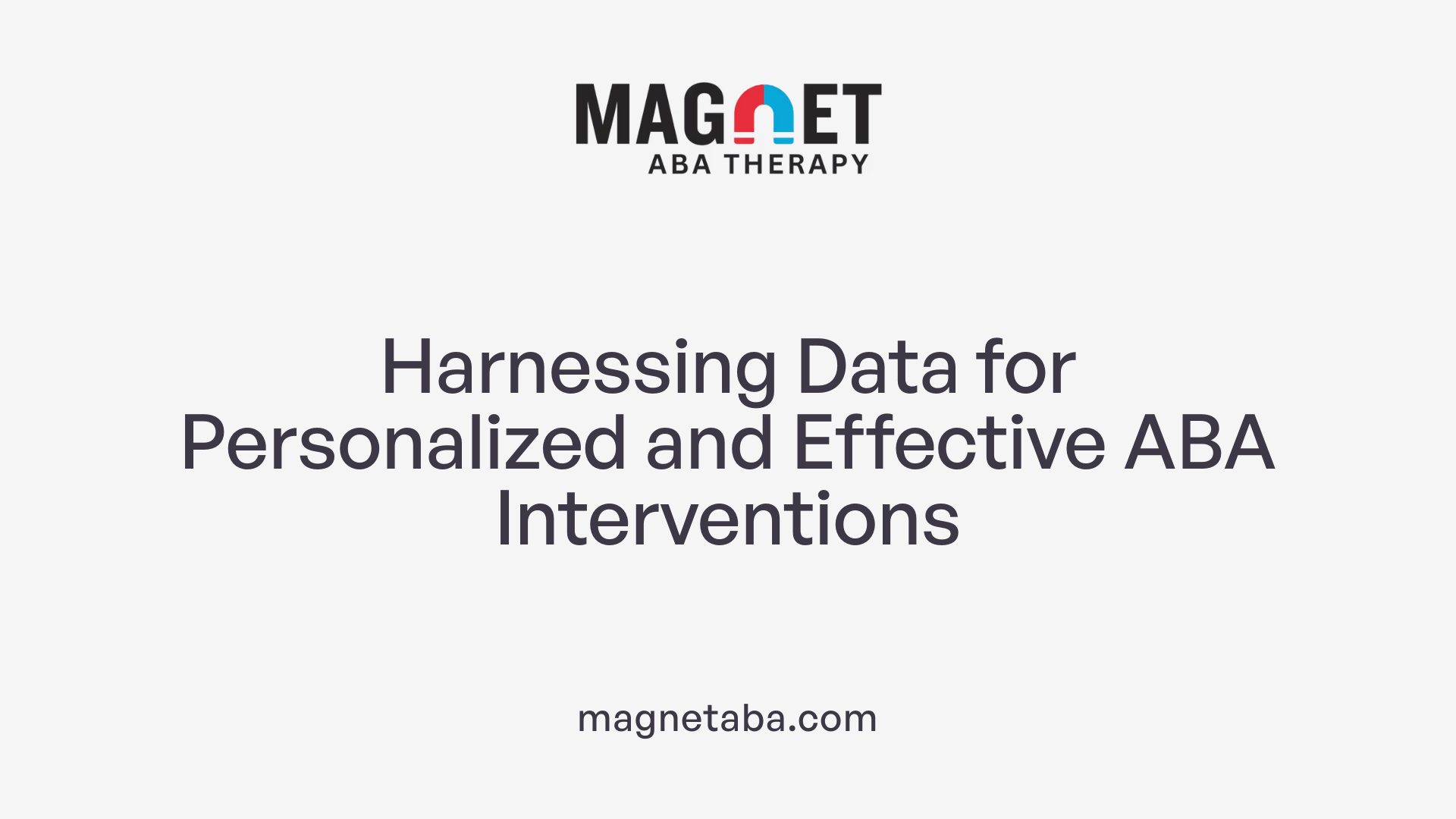Transforming ABA Therapy with Data-Driven Strategies
In the realm of autism treatment, Applied Behavior Analysis (ABA) stands as a cornerstone, recognized worldwide for its effectiveness and scientific backing. MagnetABA exemplifies how leveraging technology and meticulous data analysis can elevate therapy outcomes, ensuring personalized and adaptive interventions that align with each child's unique developmental journey.
The foundation of ABA therapy and its evidence-based approach

How does the use of data impact the efficacy of ABA therapy?
Data collection is essential in ABA therapy as it directly influences treatment effectiveness. By systematically tracking a child's progress, therapists can evaluate whether specific strategies lead to improvements or need adjustment. This ongoing monitoring enables personalized interventions tailored to each child's unique needs, increasing the likelihood of meaningful skill development.
Research indicates that ABA interventions heavily dependent on data analysis yield significant gains in areas such as communication, social skills, and problem behaviors. For example, meta-analyses of ABA studies reveal notable improvements in IQ scores and adaptive functioning when treatments are continuously refined based on collected data. This approach ensures interventions are evidence-based, targeted, and adaptable.
While the overall effectiveness of ABA is well-supported, the quality of studies depends on rigorous data collection and analysis. Incorporating advanced tools, such as AI-driven systems, enhances data accuracy and insight. In essence, data-driven decision-making makes ABA therapy more precise, effective, and capable of helping individuals with autism reach their full potential.
The central role of data collection in ABA therapy at MagnetABA

How are data collection and analysis integrated into therapeutic practices at MagnetABA?
At MagnetABA, systematic data collection and analysis are fundamental components of delivering effective ABA therapy. Therapists employ various methods to capture specific behavioral information, including frequency, duration, latency, and ABC (Antecedent-Behavior-Consequence) data. Each method is chosen based on the targeted behaviors and situational context, ensuring that measurements are both reliable and meaningful.
Frequency data track how often a behavior occurs within a set period, providing clear insights into behavioral patterns. Duration data measure how long a behavior lasts, helping identify improvements in self-regulation or engagement. Latency data record the time between a stimulus and a response, which is useful for understanding response efficiency. ABC data involve detailed recording of antecedents and consequences associated with behaviors, offering a comprehensive view of triggers and reinforcement.
Consistent and accurate data collection allows therapists to monitor each child’s progress regularly. By analyzing this information, clinicians can determine whether interventions are effective or need adjustments. This continuous evaluation supports the personalization of therapy plans, ensuring that goals are aligned with each child’s unique needs.
Data sharing with families is another crucial aspect. Transparent communication about progress helps build trust and encourages parent involvement in implementing strategies at home. It also motivates families by showing tangible evidence of development.
Overall, data collection and analysis are seamlessly woven into MagnetABA’s therapeutic approach. They enable real-time decision-making, promote accountability, and help deliver a high standard of care—ensuring that each child receives tailored treatment aimed at meaningful improvement.
Advanced technology and tools fueling data-informed ABA practices

What technology and tools are used by MagnetABA to implement data-informed ABA approaches?
MagnetABA integrates a variety of high-tech tools and software designed to enhance data collection and analysis in ABA therapy. One of the core features is the use of digital devices like tablets and smartphones, which allow therapists to record real-time data during sessions. This immediate data entry improves the accuracy and efficiency of tracking a child’s progress.
The systems used by MagnetABA often include customizable data fields, giving practitioners the flexibility to tailor data collection to each child's unique goals. Automated reporting functions generate detailed progress summaries and help identify areas that need additional focus. These reports can be seamlessly integrated with practice management software, making administrative tasks more manageable.
Telehealth platforms are also a vital part of their approach. These platforms are HIPAA-compliant, ensuring that all video calls, messaging, and data exchanges meet strict confidentiality standards. This allows for remote therapy sessions, making ABA services more accessible to children and families who may not be able to attend in person.
Overall, the combination of real-time data collection, automated reporting, and secure telehealth ensures that ABA therapy at MagnetABA is both personalized and data-driven. These digital tools facilitate better treatment outcomes and foster stronger communication between therapists, children, and caregivers.
Empowering therapists through data analysis and evidence-based practices
 How does MagnetABA use data analysis to individualize treatments and refine interventions?
How does MagnetABA use data analysis to individualize treatments and refine interventions?
MagnetABA harnesses detailed data collection to tailor therapy plans specifically for each child. Therapists gather continuous information on skill acquisition, behavioral reduction, and generalization. This data provides clear insights into what strategies work best for each individual, enabling dynamic adjustments to interventions. Regular review of data allows clinicians to identify successes and areas needing improvement, ensuring that therapy remains effective and relevant.
Incorporating proven methods like discrete trial training (DTT), natural environment training (NET), and functional communication training (FCT)
MagnetABA integrates a variety of empirically supported techniques that are backed by extensive research evidence. Discrete trial training breaks skills into small, manageable steps, fostering quick learning. Natural environment training promotes skill use in everyday settings, increasing real-world applicability. Functional communication training teaches children effective ways to express their needs, reducing frustration and problematic behaviors. These methods are complemented by visual supports and other tools shown to enhance understanding and engagement.
Ongoing progress monitoring and treatment adjustments based on data
Continuous assessment through data collection is fundamental to the effectiveness of ABA therapy at MagnetABA. Therapists routinely analyze progress metrics and make evidence-based adjustments to interventions. This iterative process ensures that therapy remains responsive to the child's evolving needs. Data-driven decisions facilitate the rapid identification of what strategies yield the best outcomes and help set realistic, measurable goals.
By combining a robust data analysis framework with established therapeutic techniques, MagnetABA ensures interventions are both scientifically validated and customized. This approach maximizes skill development, promotes independence, and minimizes ineffective strategies, providing children with the best chance to thrive.
The impact of data utilization on therapy outcomes and future perspectives

How does data utilization influence the effectiveness of ABA therapy?
Data plays a crucial role in enhancing the results of ABA treatment. By systematically collecting and analyzing information during therapy sessions, practitioners can objectively measure a child's progress in areas like communication, social interaction, and daily skills. This ongoing evaluation allows for immediate adjustments to interventions, ensuring they are tailored to the child's evolving needs. Research confirms that ABA therapies grounded in meticulous data collection can significantly improve developmental outcomes, including language skills and adaptive behavior.
Meta-analyses of ABA studies reveal that data-driven approaches yield more precise and effective treatment plans. When therapists base decisions on measurable evidence, they can identify which strategies work best for each child, leading to faster and more meaningful improvements. Overall, leveraging data sustains a cycle of continuous improvement, making ABA therapy more effective and personalized.
Elevating Autism Care Through Data-Driven Innovation
MagnetABA’s strategic integration of data collection, analysis, and cutting-edge technology exemplifies the future of personalized autism interventions. By continuously refining therapies based on empirical evidence, MagnetABA ensures that each child receives the most effective, tailored support possible. As advancements in data analytics and AI continue to evolve, the potential to further enhance the quality and efficiency of ABA therapy grows, promising brighter developmental pathways for children with autism and their families.
References
- How ABA Therapy Can Improve Your Child's Life
- Using data and technology to improve autism care
- Data Collection in ABA Therapy for Children with Autism
- Data-driven, client-centric applied behavior analysis ...
- The Critical Role of Data-Driven Decisions in Enhancing ABA ...
- Understanding the Role of Data in ABA Therapy
- Ongoing Assessment in ABA Therapy: A Data-Driven Approach
- The Evidence-Based Practice of Applied Behavior Analysis












